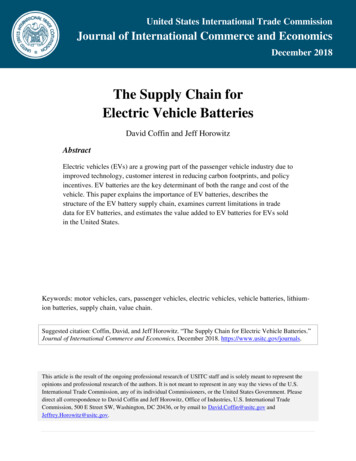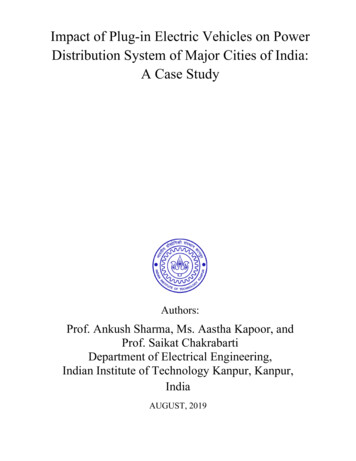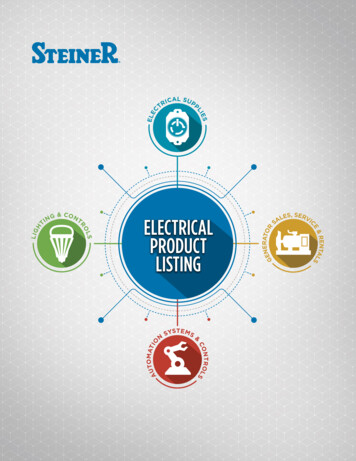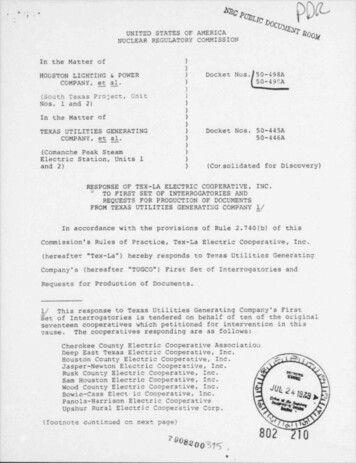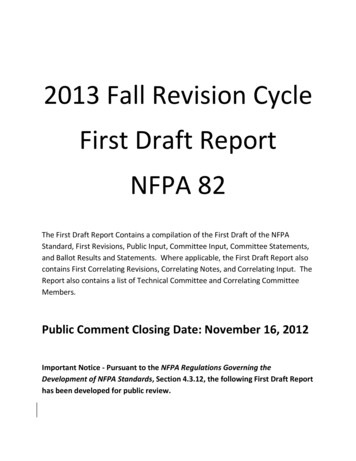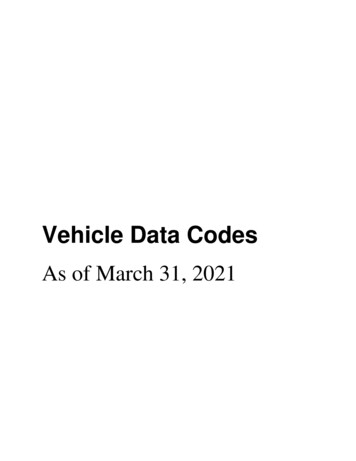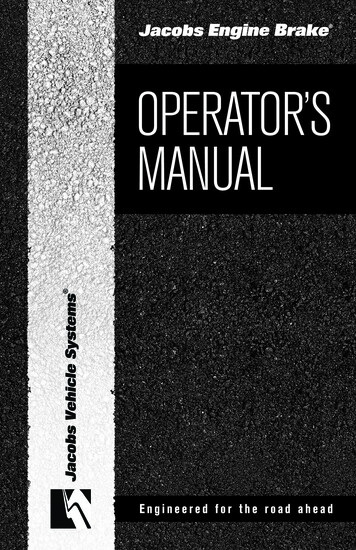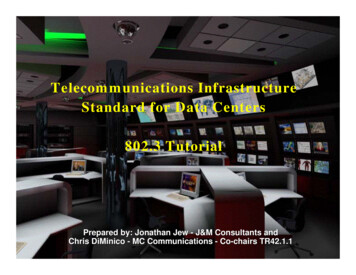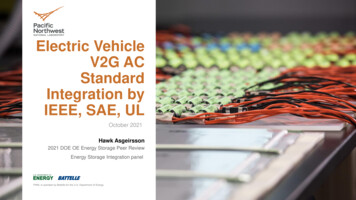
Transcription
Electric VehicleV2G ACStandardIntegration byIEEE, SAE, ULOctober 2021Hawk Asgeirsson2021 DOE OE Energy Storage Peer ReviewEnergy Storage Integration panel
Summary Alignment of IEEE and SAE on V2G Energy Storage Standards SAE J3072 Standard on the Interconnection Requirements for Onboard,Utility-Interactive, Inverter Systems, was updated and published March 10,2021 Update includes on-board grid interactive inverter requirements to accomplishV2G AC Incorporated requirement outlined in IEEE 1547-2018, IEEE 1547.1 and IEEE2030.5 UL 1741 Standard is being updated to incorporate SAE J3072 requirements inV2G AC EV designed charging station IEEE P1547.9 includes Annex on bidirectional EV chargingIEEE 1547-2018 - IEEE Standard for Interconnection and Interoperability of DER with Associated Electric Power Systems InterfacesIEEE 1547.1 - IEEE Standard Conformance Test Procedures for Equipment Interconnecting DER with Electric Power SystemsIEEE 2030.5 - IEEE Standard for Smart Energy Profile Application ProtocolUL 1741 - Inverters, Converters, Controllers and Interconnection System Equipment for Use With Distributed Energy Resources2
Communication and control illustrationEV Charging StationSAE recommendsIEEE 2030.5V2G capable EVSource: IEEE 1547-2018, 10.7 Communication protocol requirements3
Future ConsiderationsFERC/NERC/Aggregation – Distribution/BPSMobile EnergyStorage4
AcknowledgementThank you to Dr.Imre Gyuk, DOEOE EnergyStorage ProgramManager for hissupport5
Backup SlidesThank you
Electric VehicleV2G ACStandardsSAE, IEEE, ULAugust 2021Hawk AsgeirssonPNNL-SA-165682
Definitions SAE: SAE International is a global association of engineers and relatedtechnical experts in the aerospace, automotive, and commercial-vehicleindustries whose core activity is developing consensus standards SAE defines the interface (mechanical, electrical, and communication)standards on vehicles and between EVs and the electric power system (EPS) IEEE: Develops global standards for broad group of industries Electric Power System (EPS): Facilities that deliver electric power to a load EV or PEV: Plug-in electric vehicle. PEV designation is used in SAE standards V1G: Vehicle managed charging unidirectional energy management V2G: Vehicle-to-grid – Vehicle bidirectional energy flow EVSE: Electric Vehicle Supply Equipment – EV charging station8
Summary The standard SAE J3072 Interconnection Requirements for Onboard, UtilityInteractive, Inverter Systems, was updated and published March 10, 2021 Lates update includes on-board grid interactive inverter requirements It incorporated requirement outlined in IEEE 1547-2018, IEEE 1547.1 andIEEE 2030.5 This year (2021), UL is updating their standards to incorporate SAE J3072 inV2G EV designed charging station The expect UL designation will be UL 1741 Supplement C (UL 1741 SC)UL 1741 Inverters, Converters, Controllers and Interconnection System Equipment for Use With DistributedEnergy Resources9
Types of V2G Inverter Systems V2G-AC the EVSEinteracts with the on-boardEV inverter and the localEPSV1G V2G-DC the EVSEcontains the gridinteractive inverter thatinteracts with the EV andthe local EPSV1G10
SAE J3072 Interconnection Requirements forOnboard, Utility-Interactive Inverter Systems SAE J3072 Standard establishes interconnection requirements for a utilityinteractive inverter system which is integrated into a plug-in electric vehicle(PEV) and connects in parallel with an electric power system (EPS). This standard also defines the communication between the PEV and theEVSE required for the PEV onboard inverter to be configured and authorizedby the EVSE for discharging at a site. Gap - The EVSE needs to be certified by UL 1741 to conform to SAE J3072requirements11
IEEE and DER Standards referenced by SAE IEEE 1547-2018 - Standard for Interconnection and Interoperability ofDistributed Energy Resources with Associated Electric Power SystemsInterfaces IEEE 1547.1-2020 – Standard Conformance Test Procedures for EquipmentInterconnecting Distributed Energy Resources with Electric Power Systemsand Associated Interfaces IEEE 2030.5-2018 – Standard for Smart Energy Profile Application Protocol Previous versions of IEEE 1547 standards are also referenced – Mostjurisdiction in the USA have not accepted latest IEEE 1547 standards Also relied on EPRI Common Functions for Smart Inverters, Version 4 IEC 61850-90-7 Communication Networks and Systems for Power UtilityAutomation - Part 90-7: Object Models for Power Converters in DistributedEnergy Resources (DER) Systems12
SAE Major EV Documents and Functions J3072 – Interconnection Requirements for Onboard, Utility-Interactive,Inverter Systems – Standard updated and published March 10, 2021 J2836 – Instructions and Use Cases (establishes requirements)TechnicalInformation Report An available public SAE Information Report J2836 establishes the instructions for thedocuments required for the variety of potential functions for PEV communications,energy transfer options, interoperability and security (J2836 201807) J2847 – Messages, diagrams, etc. (derived from the use case requirements) J2931 – Communication Requirements, Protocol & Security J2953 – Plug-In Electric Vehicle (PEV) Interoperability with Electric VehicleSupply Equipment (EVSE)13
SAE Plug-in Electric Vehicle DocumentsV1GV2G14
Energy transfer capability – SAE J1772 Maximum energy transfer is a function of EVSE rating, EV capability andcharge cord rating (EVSE & charge cord are rated as a system) Installation of EVSE is governed by National Electrical Code, state and localbuilding codes and UL testing and listed Energy transfer is managed by the EV charging system Energy transfer rate varies over time and is a function of PEV designSAE J 1772 Electric Vehicle and Plug in Hybrid Electric Vehicle Conductive Charge Coupler15
SAE J1772 Electric Vehicle and Plug in HybridElectric Vehicle Conductive Charge CouplerElectrical Ratings16
SAE J3072 Electric Vehicle V2G AC SystemDiagram17
Communication and control illustrationSource: IEEE 1547-2018, 10.7 Communication protocol requirements18
EV On-board V2G enabled inverterSAE J3072 - Section 4 defines technical requirements System typescommunication protocol requirements 4.2.1 System Type A1 (SAE J1772 AC L2 IEEE 2030.5) 4.2.2 System Type B1 (SAE J3068 LIN-CP)SAE J3068 defines connector and control protocol for EVs, 3P & DC The inverter system shall meet the requirements of IEEE 1547-2018 The inverter system shall be tested in accordance with IEEE 1547.1-2020 The vehicle manufacturer (VM) will perform conformance testing to SAEJ3072 and provide dated certificate of conformance to SAE J3072 for thespecific inverter system model 4.6 Defines PEV Configuration and Management Information at Connectionto EVSELIN-CP: Local Interconnect Network on the Control Pilot19
Table lists the Management Information for each of thesmart inverter functions defined by IEEE 1547-2018J307261850 FunctionIEEE 1547-2018 FunctionManagement Information4.6.6.1DFPFConstant Power Factor4.6.6.2DVVRVoltage-Reactive PowerVolt-VAR Curve, DVVR:OplTmsMax4.6.6.3DWVRActive Power-Reactive PowerWatt-VAR Curve4.6.6.4DVARConstant Reactive Power4.6.6.5DVWCVoltage-Active PowerWatt-VAR Curve, DVWC.OplTmsMax4.6.6.6DHVTHigh Voltage TripOV1, OV24.6.6.6DLVTLow Voltage TripUV1, UV24.6.6.7DHFTHigh Frequency TripOF1, OF24.6.6.7DLFTLow Frequency TripUF1, UF24.6.6.8DHFWHigh Frequency DroopdbOF, kOF, olrtOF4.6.6.8DLFWLow Frequency DroopdbUF, kUF, olrtUF4.6.6.9DCTEEnter Service ParametersVHiLim, VLoLim, HzHiLim, HzLoLim,RtnDlTmms, RtnDlTmms, RtnRmpTmms4.6.6.10DWMXLimit Active Power20
Response to Area EPS Normal and Abnormalconditions IEEE 1547 Clause 5. Reactive power capability and voltage/power controlrequirements SAE J3072 specifies Normal Operating Performance Category B IEEE 1547 Cause 6. Response to Area EPS abnormal conditions SAE J3072 specifies Abnormal Operating Performance Category III21
SAE J3072 - Section 4.6 EVSE Authorization ofPEV to Discharge The EVSE shall be the gatekeeper for authorizing the PEV to discharge at aspecific site. This section describes the information to be exchanged betweenthe EVSE and PEV and logical decisions to be performed by both the EVSEand PEV before the EVSE can authorize the PEV to discharge during acharging session.22
EVSE and PEV Interconnection ProcessesSection 4.6 –Initialization1.2.3.4.5.PEV connected to EVSEPoint to Point communication establishedEVSE provides site Configuration Information to PEVPEV evaluates and provides PEV Configuration Information to EVSEEVSE provides static Management Information to PEVSection 4.7 –Active Engagement1.2.3.4.EVSE is sole DER Managing Entity for IEEE 1547-defined functionsEVSE provides PEV with Authorization to DischargePEV provides Monitoring InformationRequire SAE U6 to be implemented with alternate DME allowed23
Summary SAE PEV standards are updated for V2G AC and to conform to IEEE1547,IEEE 1547.1 and IEEE 2030.5 Settings are performed through EVSE PEV J3072 exchange PEV inverters will be OEM certified to IEEE 1547-2018 and 1547.1 UL is in the process of updating their UL 1741 Inverters, Converters,Controllers and Interconnection System Equipment for Use WithDistributed Energy Resources to incorporate updated SAE J3072 V2G ACstandard. UL 9741 is being updated to accommodate J3072 V2G AC update The expect UL designation will be UL 1741 Supplement C (UL 1741 SC) Once UL 1741 SC is published, the V2G AC EVSE can be labeled andaccepted by local AHJAHJ - authority having jurisdiction: Authority having the rights to inspection and approval of the design and construction of LocalEPS premise electrical systems24
Thank you25
Supplemental slides26
27
SAE - PEV Energy Control Classifications28
Proposed System Concept29
Electric School Bus Providers Blue Bird Corporation (Georgia) – J1772, Level 2 @ 19.2 kW, DC @ 60 kW Collins Bus Corporation (Kansas) – J1772, Level 2 @ 19.2 kW, DC @ 60 kW Lion Electric Company (Quebec) – J1772, Level 2 @19.2 kW, DC @ 24/50kW Green Power Motor Co. (Vancouver & California) – J772, Level 2 @ 22 kW,DC @ 100 kW30
IEEE 1547.1 and IEEE 2030.5 Settings are performed through EVSE PEV J3072 exchange PEV inverters will be OEM certified to IEEE 1547-2018 and 1547.1 UL is in the process of updati

